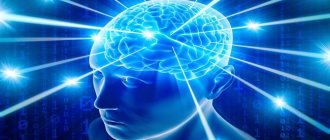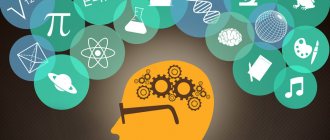Heredity
By heredity we mean those properties of an organism that are transmitted to children from parents through a certain genetic code. In this case, mainly physiological data is transmitted: the structure of the body, features of functioning, some diseases and inclinations for certain areas of activity (music, drawing).
If we talk about the concept of heredity, then the behavior and development of the individual are determined, first of all, due to the innate characteristics inherent in the formation of the organism. This can be confirmed by the expression “talent will always find its way,” even under negative life circumstances and growth conditions.
It is believed that congenital inclinations or, in other words, heredity are fundamental. However, is this so? There are situations when a person changes over the years and discovers new facets of ability or works on the formation and development of such.
And as for the root cause in physiological characteristics, we can recall the stories of a human baby entering the animal world from the first days of life. For example, the wolf article. It was only in the cartoon that Mowgli was strong and brave; in reality, such children did not have speech or communication skills, and their habits completely copied the animals that were nearby.
Maybe society plays a key role after all, because man is a social being? Let's analyze in more detail the second condition, which has a significant impact on personality development.
Characteristics of Personal Development
Here are the main features or benefits of investing in your personal development:
- Awakens your consciousness.
- Encourages self-discovery, which allows you to learn to be happier in life.
- Promotes people's empowerment.
- Requires control over emotions and feelings (for this you need to know and study what emotional intelligence is).
- Requires making conscious and responsible decisions to achieve a good quality of life.
- Helps improve interpersonal relationships.
- Arouses interest in leadership, so it is important to be a good leader.
Habitat
Of course, the environment and communication with people largely determine the personality; the child absorbs the culture, norms and rules of behavior accepted in a certain society. And people of different nationalities and cultures can be radically different. Thus, we come to the conclusion that everything is closely interconnected.
Naturally, family, friends, kindergarten and school have a great influence on a person. The child is taught to certain norms and rules of behavior, and the foundations are laid for the formation of moral principles. Under the influence of the people around them, children learn role-playing games, behavior patterns, absorb and learn a huge amount of knowledge thanks to the school curriculum.
Proponents of the “environment” theory believe that a person, like a blank slate, comes into this world, and parents and environment write and create personality. However, we often hear comments that even in the same family, under equal conditions, children are completely different? This means that the natural principle also has a great influence on the development of personality.
So, there are two basic conditions - the external environment and heredity. The question arises: can a person independently influence his development or does everything depend on external factors?
Recommendations
G.M. Zarakovsky believes that it is possible to develop and unlock potential through decency, justice, kindness, loyalty, optimism, friendliness, sincerity, productivity, effectiveness, naturalness, self-development and reflection. Based on this, we have prepared several more practical recommendations.
To release your potential, focus on three things:
- Setting goals. Think about what tools will help you become yourself, navigate your way through life, achieve success and become happy.
- Achieving goals and overall productivity. Think about how you will motivate yourself.
- Stress resistance or resilience. Learn to remain productive regardless of external circumstances.
Personal influence
A person continues to develop throughout life. Naturally, everyone has certain inclinations, innate characteristics that we do not choose - there is a family and habitat that we can partially correct over time. How to be? A strong personality who knows what he wants will always strive for self-development, direct it to the necessary character traits, abilities, areas of life. Only through willpower and constant work can one influence these processes.
Moreover, philosophers consider work both literally and figuratively. Labor has made a person a person; in the process of activity and direction of his efforts, the person also develops and acquires certain skills. There is also professional growth, as one of the facets of a holistic personality.
Now psychologists are talking more and more about the personal factor of development and calling for responsibility for one’s life. It is wrong to say that I am the way nature created me and I can’t do anything; this is a passive position in life.
Parental role in shaping the child’s personality
The most important role in the formation of personality is assigned to the father and mother. It is in the family that the foundation of behavior, understanding of the outside world, kindness and evil, good and bad, is laid. First of all, the child is guided by the image of his parents when choosing his social circle in the future. Despite the educational process, parents will be perceived differently over time, but the fundamental basis will still be taken from them.
If the images of the father and mother are positive, then the child’s psyche will be healthy, his behavior will be adequate, and he will be able to cope with all the difficulties in life. Observing negative images of parents, where total control and submission reigns, can undermine the psyche of a child, and not only a child, but even an adult, which will negatively affect the quality of his life.
Views on Personality Development
For many years and centuries, discussions have continued on the topic of the conditions for the development of a person’s personality and influencing factors. V. Stern was inclined to the duality of human nature and the balance of biological and social factors as interconnected and inseparable in their influence.
S. Freud put forward another theory, suggesting a confrontation between two main factors in a person - the constant desire for pleasure and the reality of life. Freud in psychoanalysis considers personality at the level of basic instincts that influence life and the formation of personality - a person strives to realize and obtain the necessary pleasures and only morality, the norms of society, restrain him in this direction.
The theory was called "confrontation of two factors." At different times, this idea was supported by A. Adler and K. Jung. There were also psychologists who criticized Freud's assumptions, believing that they led to a strong opposition between the individual and society.
Everything flows and develops. New research has made it possible to discover a new biogenetic law of E. Haeckel and F. Muller, according to which ontogeny (individual development) is a short repetition of phylogeny (development of the species). These stages of development can be observed in the development of the embryo. This theory is quite interesting and partly true - man repeats his ancestors in his development.
Moreover, such reduced copying is not observed for all characteristics of the organism; some properties arise as a result of adaptation to the external environment. In the 30-70s of the 20th century, there was an opinion that a person in his development repeats the development of his species: an infant is at the stage of mammals, at the end of the first year - at the stage of a monkey, in the second year - reaches human development, in adulthood - the level of modern culture .
Quite an interesting theory, although personality development is a rather complex process, and it cannot be characterized by just one parameter. Rather, it is a complex of conditions and factors that inextricably influence a person. At the same time, a strong, stable personality independently shapes himself in the process of life to a greater extent than a weak-willed person who absorbs everything from his environment.
Structure of personal potential
Personal potential includes two main substructures and auxiliary qualities on which it is based and which help in its development. Let's present this in table form:
| Main substructures | Basic qualities |
| Realized abilities, that is, what a person already knows, can, uses, does. | Systems thinking |
| Organization skills | |
| Communication competencies | |
| Ability to work in a team and under stress and uncertainty | |
| The need for self-education, self-development and the ability to self-learn, self-develop | |
| Unrealized abilities, that is, what a person does not yet know about himself, because while there was no need for this, hidden abilities were not in demand. | Reflection skills |
| Leadership abilities | |
| High adaptive abilities | |
| Ability to live, work, create in psychologically, economically and socially unstable conditions | |
| Ability to withstand adverse psychological, social and economic factors | |
| Creativity | |
| Psychological flexibility and mobility of thinking | |
| Skills for optimizing your own behavior | |
| The desire for a healthy lifestyle |
Qualities are needed both for those abilities that have already been revealed, and for those that remain to be revealed.
Patterns of personality development
The development of personality, its formation is an interconnected and holistic process, which is characterized by stages of personality development. Let's think about the question: what are the patterns of personality development? Why does personality develop and how does it happen?
So, the main patterns of personality development:
- Age factor - the younger a person is, the faster his physical development occurs. Over time, the process slows down. There are similar observations about spiritual development; the younger a person is, the faster his spiritual growth occurs.
- Therefore, we often hear that young and old, children understand old people very well, they can quickly understand the story, show interest, absorb knowledge and feel the state of mind of the narrator.
- Uneven development is observed in the presence of certain periods of growth, which we observe in the development of our children. The body does not develop constantly, it seems to us that the child suddenly begins to grow at a certain stage, these are the physiological characteristics of the body. The same can be said about spiritual development - there is unevenness
At different times, a person’s properties can change and be at different levels of development. In life there are more favorable conditions for personal development and less favorable ones. However, these conditions will be temporary. What influences a person?
Of course, communication with the outside world and people, spiritual development occurs in the knowledge of the world and oneself. There are also leaps in the development and awareness of processes due to stressful situations that make fundamental changes in a person’s personality. “Every cloud has a silver lining,” people say. Even in times when the world seems to be collapsing, think about what you will build from scratch.
3. Fluctuations in development - the organs of the human body develop each at their own pace. This is reflected in mental and nervous processes. Basically, differences between people and the level of development are manifested in behavioral aspects, thinking, intellectual level, social and moral development.
Important conditions for personal growth
Concept and structure of personality.
In psychological science, the categories man, individual, personality, and individuality are among the basic categories. The problem of personality in psychology also appears as an independent one. The most important theoretical task is to discover the objective foundations of those psychological properties that characterize a person as an individual, as an individual and as a personality. A person is born into the world already a human being.
The concept of man is the broadest. This is the accepted classical scientifically generalized name for a special type of living being - “homo sapiens”, or homosapiens. This concept combines everything: natural, biochemical, social, medical, etc.
Individual is a category indicating membership in the human race. This concept expresses a person’s gender identity, i.e. every person is an individual.
Personality is a person who develops in society and interacts and communicates with other people through language.
Every normal person has several personal manifestations depending on which part of society he is projected onto at the moment: family, work, study, friendship. At the same time, the personality is holistic and unified, systemic and organized.
In psychology, there are other, narrower interpretations of the understanding of personality, when they highlight certain qualities that supposedly act as integral attributes for it. Here it is proposed to consider only someone, for example, who is independent, responsible, and highly developed, as a person. Such criteria are usually subjective and difficult to prove.
Individuality is a category that emphasizes the uniqueness, originality and independence of each psyche (personality, individual, person).
The psychological structure of a personality is a holistic model, a system of qualities and properties that fully characterizes the psychological characteristics of a personality (person, individual).
All mental processes are carried out in a person, but not all act as its distinctive properties. Each of us is in some ways similar to all people, in some ways only like some, and in some ways unlike anyone else.
In psychology, there are a huge number of models of the psychological structure of personality, which stem from various theories about the psyche and personality, from different parameters and tasks.
This basic model is based on the personal-activity approach. This structure includes six interconnected substructures. They are conventionally singled out only to obtain some scheme of a complete personality.
So, the following psychological components, or substructures, are distinguished in personality:
§ self-awareness
§ personality orientation
§ temperament and character;
§ mental processes and states;
§ abilities and inclinations;
§ mental experience of the individual.
The personality structure can be - theoretically - represented by the following scheme, which, of course, is very conditional:
1) universal human properties (sensations, perceptions, thinking, memory, will, emotions);
2) socially specific features (social attitudes, roles, value orientations);
3) individually unique traits (temperament, combination of roles, self-awareness).
Interactionists identify three main components
in the personality structure: I, me, self.
1) I (literally – “I”) is the impulsive, active, creative, driving principle of the personality;
2) me (literally – “me”, i.e. how others should see me) is a reflexive normative “I”;
3) self (“self” of a person, personality, personal “I”) – a set of impulsive and reflexive “I”, their active interaction.
Stress resistance
Stress is an English word that comes from the French estresse, which means depressed, depressed. This concept was introduced by the Canadian scientist Hans Selye; he defined stress as a reaction of neuropsychic stress that occurs in emergency circumstances and is designed to mobilize the body's defenses. Today, stress increasingly refers to stressful effects: significant physical and mental stress that leads to stress. The body's ability to cope with these overloads is called stress resistance.
For example, noise in a call center, bustle in a sales area, long working hours, constant communication with a large number of customers - all these are stressful situations. Each applicant puts his own meaning into the concept of “stress resistance” - depending on his profession and functional responsibilities. Sales managers understand stress resistance as the ability to calmly respond to negativity from a client, and auditors understand it as a “last minute” plan or working from home.
Stress resistance is a set of personal qualities that allow a person to endure significant intellectual, volitional and emotional stress (overload), caused by the characteristics of professional activity, without any particular harmful consequences for the activity, others and one’s health. At the same time, an artificial decrease in the level of sensitivity to external stimuli, associated with this quality, in some cases can lead to callousness, lack of strong emotions and indifference - that is, to properties that often lead to negative results in a person’s family and social life.
Stress resistance is a certain combination of personal qualities that allow you to endure stressful situations without unpleasant consequences for your activities, personality and others.
All people can be divided into 4 groups based on stress resistance.
Stress-resistant people are always ready for any changes and accept them with ease. They easily overcome difficulties in crisis situations.
Stress-resistant people find it difficult to adapt to any changes; it is difficult for them to change their behavior, attitudes, and views. If something goes wrong, then they are already in a state of stress.
Stress-trained people are generally ready for changes, but not instantaneous or global ones. These people tend to adapt to their environment gradually, without sudden movements, but if this is not possible, they easily become depressed. If the same situations that cause stress are repeated, then stress-trained people get used to them and react to them more calmly.
Stress-inhibited people will not change under the influence of external events; they have firm positions and their own worldview. However, such people can make a one-time change in a traumatic area of life. If stress constantly accompanies such a person, then he becomes lost.
Personal activity.
Personal activity (from the Latin activus - active), a person’s active attitude to the world, a person’s ability to make socially significant transformations of the material and spiritual environment based on the development of social history. human experience; manifests itself in creativity. activities, acts of will, communication. Integral characteristic of A. l . - a person’s active life position, expressed in his adherence to principles, consistency in defending his views, unity of word and deed. In A. l. human morals are embodied. values that determine the nature of his behavior. Activism can pursue humanitarianism. and anti-humanistic. goals, have a socially useful and asocial orientation. The defining moral basis of A. l . - intolerance to all manifestations of evil. The possibility of activity depends on the degree of citizenship. human freedom, the presence in society of legal guarantees for initiative and initiative.
In psychology A. l
., due to internal human motives, is considered in contrast to reactivity - behavior depending on ch. arr. from external influences and “adjusting” to given conditions. In the practice of teaching and upbringing, underestimation of the child is often encountered: an obedient, dutiful child is rated higher by parents and teachers than a seeking, interested, “non-standard” child.
The basis of a person as an individual is his own activity. It is not identical to activity. Activity and activity are independent of each other. Activity has an objective character, in contrast to activity, which is symbolic. Activity is manifested in the relationships in which a person is involved and which he builds by performing some activity.
Voluntary and involuntary activity are distinguished. Voluntary activity manifests itself in achieving a certain result, in the form of pre-set goals, controlled during the process itself. Involuntary activity associated with experiences, sleep, dreams. With this type of activity, a person reflects passively. Involuntary behavior includes: reflex responses (for example, the blink reflex); indicative reaction; wrong actions.
The source of human activity is needs.
Personal growth.
Personal growth, personal growth - positive changes in a person’s personality, strengthening the core and increasing the potential of the individual.
Personal growth is understood in two ways: as a measurable fact, as the result of some process, and as a special process that occurs precisely as growth, as the natural unfolding in a person of what is inherent in him by nature or has become his second nature.
Personal growth as a process, as one of the mechanisms of personal growth and development, is positive changes in the personality that occur as a result of the natural unfolding in a person of what is inherent in him by nature or has become his second nature.
Unlike the process of personal growth, which is more interesting to academic psychology, ordinary people are more interested in the result of personal growth. It is not always clear what happened to a person, but in some cases we can say: personal growth happened to a person. The person became different: the core was strengthened and the potential of the individual increased. The person began to manage his life better, became stronger, deeper and internally richer.
The main characteristics of personal growth and development are its focus, activity and scale.
Personal growth depends
primarily from the efforts of the person himself, but they are not enough.
Full personal growth is possible only if a person relies on the benevolent participation of others, if he achieves recognition and respect for his inner world by other people, at least “significant others.” This is easy to understand, since personal potential is closely related to the “I-image”, which, as we already know, is formed in joint activities with other people. With personal growth, changes occur both in a person’s inner world and in his relationships with the outside world. The essence of these changes
is that a person gradually frees himself from the distorting influence of psychological defenses and becomes able to trust the information he perceives.
A more developed personality will first of all try to think deeply about the criticism and look for a rational grain in it. In addition, it is necessary to analyze what caused the criticism and why it was made by this particular person at this moment. Perhaps the actions being criticized were misunderstood by other people, and you need to somehow change your behavior or provide clarification. The critic himself is seen not as an enemy, but as a source of valuable information. Even if a person comes to the conclusion that the criticism of his actions was completely unconstructive, he will gain invaluable experience.
The process of personal growth is continuous
. It may be slower during quiet periods of life, when there are no complex life problems to solve and communication is not very intense. It can be more intense during periods of life crises and/or during intense communication - interaction with other people.
The very fact of movement is important for personal growth. The process of personal growth is holistic, interconnected, and growth in one “personal dimension” contributes to advancement in others. Discovering and finding oneself allows a person to become more and more free and responsible, friendly and open, strong and creative and, ultimately, more mature and able to perceive the world (external and internal) not as a threat, but as conditions for his life.
Important conditions for personal growth
In order to make yourself happy, first of all, it is important to take responsibility for your life. Next, you need to want to change. Desire is your fuel that will lead you forward. It is also important to believe in yourself. Faith is your best helper, your inspirer. Faith is an important condition for personal growth. And the last ones are your activity. Without action and self-discipline, you will not achieve the desired result.
Personal potential development
Personal potential is a person’s ability to multiply his internal capabilities, first of all, the ability to develop. Personal potential is the ability to live a rich inner life and effectively interact with the environment, to be productive, to influence effectively, to grow and develop successfully.
Personal potential includes:
· health mental, spiritual, personal and psychological.
· meaningful content of life (interests and incentives to live, the meaning of life, favorite thing)
· general and emotional intelligence.
This or that combination of these internal components gives such external indicators as internal culture, internal freedom, voluntary responsibility, love for people, the world and oneself, energy, skills and life strategies, vision of prospects.
A person without personal potential (low potential) is a dummy. A person with high personal potential is a promising person, a personally rich person.
The development of the personality potential of an adult undoubtedly depends on how much he is able to reveal his talents, which for some reason have not been identified or are not developed. For example,
the girl always knew that she loved to draw and she was good at it.
But life made her forget about her favorite pastime, she studied to become an accountant and got a job... In addition, housework and family required attention, there was not enough time to think about herself. But the children grew up, and over time she realized that accounting was not her calling, but simply a way to earn a living. Why doesn't she do what she loves and turn it into a source of income? The most successful people are those who have turned their passion into a way to make money.
Every person is a storehouse of talents, abilities and skills
.
All people came into this world for a reason, and understanding one’s nature is the main task in human life. Methods of searching for reserves in the development of a person’s hidden potential can be divided into internal and external. Internal reserves (we draw from ourselves): reading spiritual literature meditation gaining new knowledge (self-study) keeping a diary remembering our past successes
External reserves (finding people, circumstances that contribute to disclosure): attending a training on a relevant topic consultation with a psychologist (numerologist, astrologer) conversation on souls with a spiritually developed person helping other people communicating with children, animals visiting a temple communicating with their Teacher (trainer, teacher)
Conditions for the development of human personality: motor skills and child development
For the spiritual development of a person, certain stages are distinguished - age limits characteristic for the acquisition of certain qualities. It is customary to call such periods “sensitive”. Based on research data, psychologists can determine whether a child is developmentally appropriate for his age or diagnose developmental delay.
Thus, for the development of speech, the optimal period is considered to be 1-2 years, and intellectual development most actively occurs before the age of 13. The basis of such periods is that the maturation of the nervous system and brain occurs not constantly, but in periods. Everything in the body is formed gradually and acquired experience plays a very important role.
Now there are special schemes of work to help children who have developmental delays, based on the complex use of treatment by a neurologist, sessions with a psychologist and speech therapist. As a rule, speech development is associated with the maturation of the cerebral cortex, and there are special methods to speed up such processes (medicines, sensory training, Montessori games).
With physical retardation, it often happens that children begin to walk later; there are also programs - massage, swimming, exercise therapy. It is very important to monitor these moments and help children develop comprehensively in time.
Qualities
Stability of qualities - as a result of personality development, a person acquires stable and permanent mental qualities, but plasticity is also preserved. The complexity of these processes comes down to the fact that a person acquires character traits and at the same time there is always the possibility of changing them and improving them under the right circumstances of life. Thanks to the plasticity of the nervous system, education is possible.
And besides, compensation occurs due to stronger personality traits. So, for example, there are children who grasp knowledge on the fly without working too hard, while others achieve results through hard work, which compensates for their weaker memory.
Every person has strengths and weaknesses, and the strong ones very often override the weak ones and allow them to successfully cope with life situations.
Integration
Personal development occurs as a merging of different spheres - intelligence, spiritual development, emotional component, spirituality. Each sphere integrates its own properties. So, emotional - feelings, intellectual - mind. Over time, a person’s psyche hardens and strengthens; in adulthood, a person reacts more calmly to life’s difficulties, with a sufficient level of development. In addition, a worldview and understanding of life processes are formed.
At every stage of life, a person has a dominant activity, which has a great impact on the development of personality.
During school years we study, acquire knowledge and communication skills. As adults, we learn in the process of interaction in the family, communication with loved ones, as well as the work team and profession leave their imprints, the professional development of the individual is formed. All this contributes to the formation of mental qualities and personality traits.
What is personal potential
The name is derived from the Latin word potentia, which translates as “power”, “opportunity”. Personal potential in psychology is a complex of not yet discovered or unused inclinations, abilities, abilities, knowledge, skills, inclinations, characteristics of character and temperament, and personal qualities. Personal potential can be defined as the ability to manage psychological resources in one's own interests.
V. N. Markov and Yu. V. Miryanin define personal potential as the sum of personal resources in different areas: health, study, work, family, communication and others. G. M. Zarakovsky considers this as a person’s self-efficacy. The researcher believes that the quality of life of an individual directly depends on potential. In addition, many authors associate personal potential with a person’s adaptive abilities and the need to adapt to the requirements of society.
Interesting! Unlocking a person's potential is a process of self-actualization and self-realization.
Controversy and progress
Contradictory personality is a quality that Freud and other psychologists talked about. Man is structured in a rather interesting way and is constantly in interaction with the world around him. At the same time, every day he makes decisions and makes life choices, and it happens that he goes against the grain of his immediate environment in his judgments and enters into confrontation.
We can also recall situations when we have an internal conflict and struggle between different parts of the personality - an adult, a child, a teacher. Or maybe this is a conflict between good and evil, it’s hard to say, the main thing is that in these moments the truth is born, it is important to find yourself and form the necessary qualities.
The desire for progress - it is natural that everyone wants to achieve success in life; in the process of overcoming life's obstacles, on the way to the goal, character is strengthened and the strong-willed qualities of the individual are formed. All life situations are lessons that we go through, and as a reward we receive a new “I”, with new and even better qualities.
Self-development
Personal self-development - we constantly improve ourselves by working on our inner world, subordinating mental processes and emotions to our will, improving character traits. Such work can be done either independently or through special training. Each person determines for himself how it is easier for him to develop. The main thing is the desire to achieve new results, constantly work on shaping your personality, and search for the necessary information and knowledge.
Development can also act as a protective function. A person is constantly developing, both physically and spiritually, this is necessary for survival in our world. A successful life requires certain qualities, such as immunity to fight diseases, willpower to achieve results, and patience is an important weapon for conquering peaks. Naturally, for a full life we need: good health, high intellectual and spiritual qualities, which we develop in the process of life, voluntarily or involuntarily, under the influence of life circumstances.
Thus, we have examined the patterns of personality development, and now we better understand the cause-and-effect relationships. Of course, our development is influenced by many factors, the conditions for the development of a person’s personality, and yet we are happy that we can correct our life and development through our own efforts.
Tips for Improving Personal Development
- Work on yourself. For example, if you are afraid of failure and this is preventing you from making changes that allow you to experiment, live and move forward, then the wisest decision would be to seek the help you need to overcome your fears. Today there are many methods and psychological theories that can help you see the light at the end of the tunnel. You just need to take care of yourself and work on yourself every day.
- Master your mind. Train your mind to always see the positive side of life and allow you to overcome obstacles with positivity and a good attitude, because only then will you be able to get up every time you fall.
- Work on your emotional intelligence. This is a major factor in achieving personal development. Think about it, if you are not happy or do not know how to channel your feelings, thoughts and emotions, it will simply be impossible for you to lead a fulfilling life. If you know how to deal with your negative emotions, you will also know how to face adversity.
When you invest in your personal development, you can have a full and happy life in all areas.











